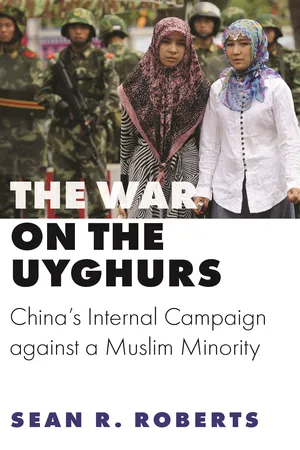
Princeton Studies in Muslim Politics
China's Internal Campaign against a Muslim Minority
- English
- ePUB (mobile friendly)
- Available on iOS & Android
Princeton Studies in Muslim Politics
China's Internal Campaign against a Muslim Minority
About This Book
How China is using the US-led war on terror to erase the cultural identity of its Muslim minority in the Xinjiang region Within weeks of the September 11 attacks on New York and Washington, the Chinese government warned that it faced a serious terrorist threat from its Uyghur ethnic minority, who are largely Muslim. In this explosive book, Sean Roberts reveals how China has been using the US-led global war on terror as international cover for its increasingly brutal suppression of the Uyghurs, and how the war's targeting of an undefined enemy has emboldened states around the globe to persecute ethnic minorities and severely repress domestic opposition in the name of combatting terrorism.Of the eleven million Uyghurs living in China today, more than one million are now being held in so-called reeducation camps, victims of what has become the largest program of mass detention and surveillance in the world. Roberts describes how the Chinese government successfully implicated the Uyghurs in the global terror war—despite a complete lack of evidence—and branded them as a dangerous terrorist threat with links to al-Qaeda. He argues that the reframing of Uyghur domestic dissent as international terrorism provided justification and inspiration for a systematic campaign to erase Uyghur identity, and that a nominal Uyghur militant threat only emerged after more than a decade of Chinese suppression in the name of counterterrorism—which has served to justify further state repression.A gripping and moving account of the humanitarian catastrophe that China does not want you to know about, The War on the Uyghurs draws on Roberts's own in-depth interviews with the Uyghurs, enabling their voices to be heard.
Frequently asked questions
Information
Table of contents
- Cover Page
- Title Page
- Copyright Page
- CONTENTS
- Map: Xinjiang Uyghur Autonomous Region
- Foreword by Ben Emmerson
- Preface
- Introduction
- 1: Colonialism, 1759–2001
- 2: How the Uyghurs became a ‘terrorist threat’
- 3: Myths and realities of the alleged ‘terrorist threat’ associated with Uyghurs
- 4: Colonialism meets counterterrorism, 2002–2012
- 5: The self-fulfilling prophecy and the ‘People’s War on Terror,’ 2013–2016
- 6: Cultural genocide, 2017–2020
- Conclusion
- A note on methodology
- Transliteration and place names
- List of figures
- List of abbreviations
- Acknowledgments
- Notes
- Index